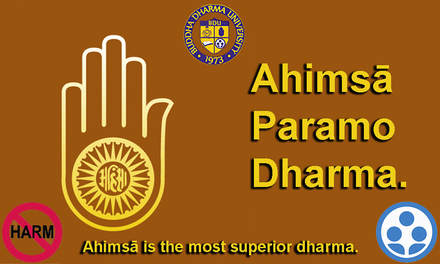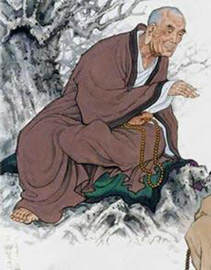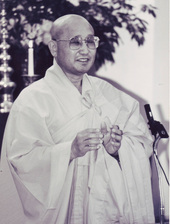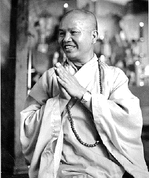The aspiration of the Five Mountain Zen Order is to act in the manner of a Bodhisattva.

Our core belief is that “only ahimsa allows humans to live together in societies at peace.” We welcome into our practice and fellowship, all people, regardless of age, political affiliation, economic reality, education, ethnicity, faith history, family structure, gender identity, nationality, physical and mental ability, race, sexual orientation and life experience.
We (as an organization) have no official political affiliations. We aspire to keep our personal opinions to a minimum because we know they can so easily become walls…creating opposites, excluding rather than including. Rather we follow the “Four Noble Truths” and the “Eight Fold Path” for guidance.
Whatever we do as members of the Five Mountain Zen Order, we aspire to do it with kindness, acceptance, respect, love, and compassion. We embrace the Sangha Guidelines as set forth by our Great Ancestor Soen Master Bojo Jinul and as interpreted by Soen Master Seung Sahn.
Remember: we share a common humanity. None of us wants to suffer. This is why our aspiration is harmony…inflicting no harm upon anyone – including ourselves.
When we encounter someone with a different lifestyle from our own (and we do), please take time to get to know him or her as a person, not as a group or a cause or a person associated with a political party. We aspire to keep our minds, our ears…and our hearts…open to infinite possibilities.
It is not skillful to be opinionated. Zen Master Seung Sahn taught us, “You must relinquish your opinion, your condition and your situation.” Should any member of FMZO ever discover that your own opinion – whatever it is – is not being respected, let us know.
Yet, please realize that not all opinions will, can, or should be changed. It’s not our job as members of the Five Mountain Zen Order to support or deny anyone’s opinion. It’s our job to clarify what it is to be a human being, and to wake up to our true nature. All else is illusion.
We (as an organization) have no official political affiliations. We aspire to keep our personal opinions to a minimum because we know they can so easily become walls…creating opposites, excluding rather than including. Rather we follow the “Four Noble Truths” and the “Eight Fold Path” for guidance.
Whatever we do as members of the Five Mountain Zen Order, we aspire to do it with kindness, acceptance, respect, love, and compassion. We embrace the Sangha Guidelines as set forth by our Great Ancestor Soen Master Bojo Jinul and as interpreted by Soen Master Seung Sahn.
Remember: we share a common humanity. None of us wants to suffer. This is why our aspiration is harmony…inflicting no harm upon anyone – including ourselves.
When we encounter someone with a different lifestyle from our own (and we do), please take time to get to know him or her as a person, not as a group or a cause or a person associated with a political party. We aspire to keep our minds, our ears…and our hearts…open to infinite possibilities.
It is not skillful to be opinionated. Zen Master Seung Sahn taught us, “You must relinquish your opinion, your condition and your situation.” Should any member of FMZO ever discover that your own opinion – whatever it is – is not being respected, let us know.
Yet, please realize that not all opinions will, can, or should be changed. It’s not our job as members of the Five Mountain Zen Order to support or deny anyone’s opinion. It’s our job to clarify what it is to be a human being, and to wake up to our true nature. All else is illusion.

In the Five Mountain Zen Order, we trace our roots back to Dàhuì Zōnggăo and teach directly out of the Kānhuà Chàn method of kongàn study. Master Dàhuì attained enlightenment at an early age, it is estimated that he was either 26 or 27, and was initially assigned as the principle teacher to the Lay Students who were practicing under the tutelage of Chán Master Yuánwù Kèqín.
Because of this, Dàhuì wrote many of his treatises with the Lay Student in mind. It is because this great teacher stepped out of the normal function of a monk and spent his time almost exclusively teaching Kongàn’s as well as educating Lay Students in his early years of practice, that we today have a methodology that can work within the life of a householder.
Another little known fact has recently come to light, Dàhuì also taught nuns and was the first Chàn Master to have an officially recognized Female Lineage Holder, thereby establishing a precedent that seems to have been overlooked by subsequent generations of Chàn Teachers.
In the Tenth Century ACE, for the first time in an official, Imperially Sanctioned Chàn Genealogical History, two Sung women were recognized as Masters of Chàn, and what they were doing, teaching, and writing was officially recognized as Chàn activity, teaching, and writing in China. Their names were Miàozǒng Chánshī and Miàodào Chánshī.
Because of this, Dàhuì wrote many of his treatises with the Lay Student in mind. It is because this great teacher stepped out of the normal function of a monk and spent his time almost exclusively teaching Kongàn’s as well as educating Lay Students in his early years of practice, that we today have a methodology that can work within the life of a householder.
Another little known fact has recently come to light, Dàhuì also taught nuns and was the first Chàn Master to have an officially recognized Female Lineage Holder, thereby establishing a precedent that seems to have been overlooked by subsequent generations of Chàn Teachers.
In the Tenth Century ACE, for the first time in an official, Imperially Sanctioned Chàn Genealogical History, two Sung women were recognized as Masters of Chàn, and what they were doing, teaching, and writing was officially recognized as Chàn activity, teaching, and writing in China. Their names were Miàozǒng Chánshī and Miàodào Chánshī.

Miàodào Chánshī was also known to her contemporaries and in subsequent genealogical histories as Jiguāng Dàshī (Great Teacher Light of Concentration). Furthermore, she was the first person of either sex to experience a great awakening using the Huàtóu method under the guidance of the founder of Kānhuà Chàn (kongàn introspection) practice in the Línjì Chàn lineage, Dàhuì Zōnggăo. As a result of her experience, she became Dàhuì's actual first dharma heir; an important teacher of women, and a participant in the early Southern Sung revival of Línjì. She and her teacher Dàhuì blazed the way toward a more widespread acceptance of women Chàn teachers as a lineage members within Chàn.
In the Five Mountain Zen Order two of our root teachers, Zen Master Seung Sahn and Ven. Thích Thiên-Ân, were also progressive Chàn Masters of the 20th Century. Both of these teachers were steadfast in their direction of equanimity and teaching. They both ordained women as well as giving them Dharma Transmission, they both gave Teaching Authority to young people. And Zen Master Seung Sahn as well as a Dharma Heir of Ven. Thích Thiên-Ân openly ordained and gave transmission to at least one openly LGBT community member each.
In the Five Mountain Zen Order two of our root teachers, Zen Master Seung Sahn and Ven. Thích Thiên-Ân, were also progressive Chàn Masters of the 20th Century. Both of these teachers were steadfast in their direction of equanimity and teaching. They both ordained women as well as giving them Dharma Transmission, they both gave Teaching Authority to young people. And Zen Master Seung Sahn as well as a Dharma Heir of Ven. Thích Thiên-Ân openly ordained and gave transmission to at least one openly LGBT community member each.

Ven. Thích Thiên-Ân ordained married monks and nuns, and Zen Master Seung Sahn decided to make a special class of ordination for married practitioners, which he called the Bodhisattva Monk. We continue to make strides in our direction of non-discrimination, and the evolution of Chan Buddhism as it moves forward into the 21st Century Western world. We will be criticized and scorned by some, and to quote the words of the Founder of Daoism, Lǎozǐ, “If you seek for the approval of others, you become their prisoner.”
We don’t make changes idly or indiscriminately, rather we look within ourselves to ask ourselves what we feel is fair and just and compassionate. We will make mistakes and in the manner of a Bodhisattva we always try to make them correct when we realize the error of our ways.
We don’t make changes idly or indiscriminately, rather we look within ourselves to ask ourselves what we feel is fair and just and compassionate. We will make mistakes and in the manner of a Bodhisattva we always try to make them correct when we realize the error of our ways.
